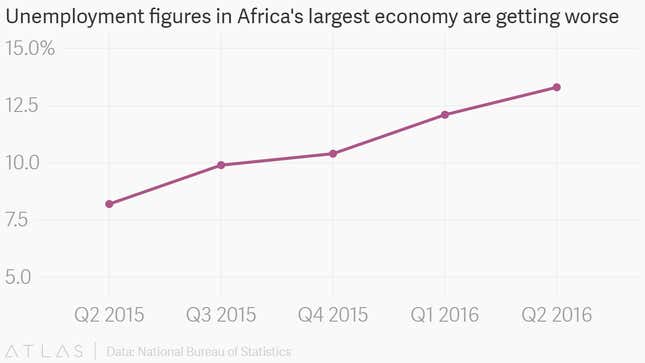Hi, Quartz Africa readers!
[insertSponsor]
A very African election
Africans at home and abroad have observed the US presidential election campaign with many mixed emotions. Many of those emotions are the same as the Americans who’ll be voting on Tuesday: horror, amazement, tedium, disappointment, occasional elation and so on. But for many Africans all those emotions are tinged with irony.
It’s all very ironic because much of what’s happened in this very unusual US election season (unusual in recent American history) are familiar themes in Africa.
A controversy-ridden former first lady is running for president against a wealthy former ally and megalomaniac who accuses the other side of rigging the election before it happens. There’s much fear of his supporters rioting if results don’t go their way. There are also rumors that some people in certain regions won’t be allowed to vote. Meanwhile, the current president’s half-brother is complaining the president hasn’t done enough for his people (in a different country). If you’d pitched that script to a Hollywood producer about an imaginary African country it would get turned down for lazy stereotyping (well, it should).
Africans on social media have had some fun pointing out the ironies but many also understand all too well the reality of living in long-term weak democracies.
Healthy democratic processes are important for a country’s development and progress but are not an end in themselves. It’s also important to have strong institutions within those democracies. That came through loud and clear this week in South Africa. It’s one thing to choose a president in a free and fair election, it’s another to have the institutions to keep the president in check. The US has those strong institutions to support or check whoever becomes president—the hope is more African countries can build the same.
Yinka Adegoke, Quartz Africa editor
Five stories from this week
South Africa’s apartheid-era chemical weapons. Details around the covert Project Coast program, the former apartheid government’s top secret chemical and biological program, came to light as apartheid ended. But as a new exhibition shows, the program is still shrouded in secrecy and historians are yet to uncover its true extent, Lynsey Chutel writes.
Kenya’s Ushahidi is monitoring the US elections. Ushahidi, the crowdsourcing crisis map tool from Kenya, has now been deployed to monitor the Nov. 8 elections next week. As Lily Kuo writes, it will allow voters to document not only possible electoral violence but also voter suppression.
African innovators can protect their inventions. An online intellectual property registration system is now being introduced in 18 African countries after its success in a pilot phase in Kenya. The process could make it easier for enterprising citizens to secure and transform their innovations into marketable assets, explains Joshua Masinde.
Facebook’s plan for faster internet in Africa. With the growing internet usage across the continent, Facebook is focusing on creating tools for faster internet connectivity. Its latest plan, called the Voyager, appears a promising solution after MTN successfully tested it in South Africa.
South Africa state captures Zuma. After weeks of delays and a legal challenge from president Jacob Zuma, South Africa’s former public protector Thuli Madonsela released a 355-page damning report that detailed the web of corruption around Zuma, and the wealthy Gupta family’s control over the country’s resources.
CHART OF THE WEEK
The terrible odds stacked against young Nigerian graduates. Hundreds of thousands of young Nigerians are applying for the mere hundreds of jobs being advertised by government agencies as Africa’s largest economy shrinks, explains Yomi Kazeem. The odds aren’t likely to improve as companies are laying off staff in industry-wide retrenchment exercises.

Message from our partner
This November, Business leaders & investors will converge in Lagos for The Emergent Continent Conference, Africa’s flagship conference on enterprise innovation with highly thematic conversations and cross-industry thought leadership sessions.
Other things we liked
Treating battered horses in the shadow of Egypt’s pyramids. For generations, many Egyptians families made their living by offering gaily decorated horses and camels to tourists around the Great Pyramids. But as Diaa Hadid and Nour Youssef write in the New York Times, to get a glimpse of the collapse of Egyptian tourism, look no further than to the gaunt, starving horses wandering the shadows of the pyramids.
Africa’s zombie banks threaten its embattled economies. Africa has been battered by falling commodity prices, an enduring drought, weakening currencies and a slowdown of its biggest trading partner, China. Renee Bonorchis writes in Bloomberg, that the continent’s small and under-capitalized banks, laden with debt, are inflicting more pain on already embattled economies.
The Nigerian communities opening their homes and hearts to refugees. Waves of conflict between the Boko Haram and the army have forced 2.1 million people in northeast Nigeria to flee their homes. Photographer Chris de Bode traveled to meet these refugees and the families who have given them shelter, food, land—and most importantly, compassion.
Keep an eye on
Elections in Somalia (Nov. 5–10) After delays and alleged corruption, federal regional governments in Somalia are holding local elections to fill the lower house of parliament. The lawmakers are expected to elect the next president on Nov. 30.
Fallout from the State Capture report. As thousands of protesters called for his resignation last week, president Jacob Zuma seemed adamant about leaving his post. On Saturday (Nov. 5), he told his supporters he wasn’t afraid of prison as the country’s anti-graft watchdog called for a judge to investigate allegations of influence-peddling.
Our best wishes for a productive week ahead. Please send any news, comments, Nigerian job applications and Egyptian horses to africa@qz.com. You can follow us on twitter at @qzafrica for updates throughout the day.
If you received this email from a friend or colleague you can sign up here to receive the Quartz Africa Weekly Brief in your inbox every week.